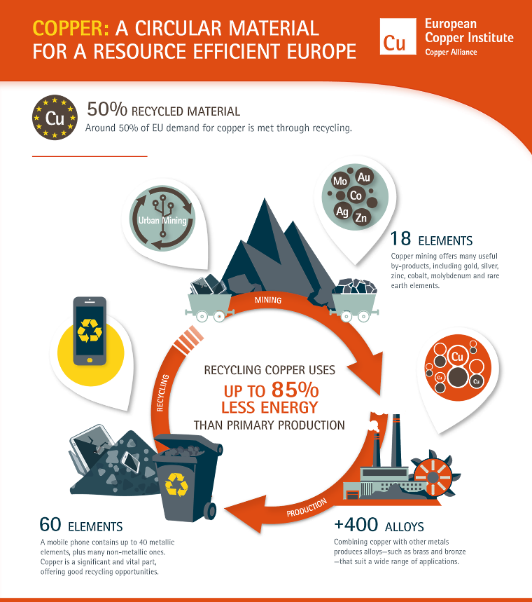One of the key parameters in terms of sustainability today is without doubt energy efficiency. Copper makes products more energy efficient and thus makes our world more sustainable. Furthermore, the most important property of copper is its ability to be recycled endlessly, without any loss of properties, either physical or mechanical. A greener, healthier and more sustainable future depends to some extent on the use of copper. Just as copper is used to improve our lives today, it will be available to future generations.
If we look at our consumption habits over the last 50 years as a global society, it is true that more and more products are being manufactured which consume more and more basic materials. Metals are extracted from minerals after some form of processing and then used in a variety of goods and products. Furthermore, metals are essential for economic development, the functioning of society and the maintenance of our quality of life.
These materials and elements are finite, and we have a responsibility to ensure that future generations will be able to recover the elements after use and reuse them appropriately for other purposes. The fact is that there are many valuable elements that are not always recovered and reused.
1/3 of copper demand comes from recycling
Since the dawn of civilisation, copper has been of decisive importance for the development and sustainability of our society. The demand for copper along with other metals (such as steel, aluminium and nickel) is growing as countries around the world develop industrially and consequently require more raw materials and we use minerals and metals in greater quantities than ever before.
Of the total of around 24 million tons of copper needed worldwide each year, 34% comes from recycling, and in Europe the figure is even higher (41%) (BGS UK). This is an example of the sustainable character of copper.

How vulnerable is the copper supply?
Without metals, we would not enjoy the lifestyle we currently enjoy. Without the continuous development of technology, processing and manufacturing, we would not benefit from reliable products such as aircraft, cars, computers, mobile phones, etc.
Copper is mined in many countries on all continents. The dependence on individual countries and players is therefore very low. Copper as a material can certainly be regarded as systemically relevant. However, the danger that the supply of copper could become critical in the future is unfounded on the basis of the arguments mentioned above.
Copper is more sustainable than assumed
The widely accepted description of sustainability is the concept of satisfying present needs without compromising the ability of future generations to meet their own needs.
Copper is the oldest metal used by man - the first copper coins date back to 8700 BC - and, alloyed with tin, forms the first alloy ever used, called bronze.
Besides copper's high conductivity, the ability to recycle endlessly is the most important property of copper. It is estimated that 80% of all copper ever produced in the last 10,000 years is still in use today.
In addition, depending on the type of scrap available, only about 15% to 40% of the energy needed to produce copper from ores is required for recycling.
Conclusion
Sustainability comprises the three dimensions - society, environment and economy. Copper as a material ideally fulfills these levels by creating prosperity, being available in large quantities, recyclable without any loss of quality and highly energy-saving. The properties of the metal itself also ensure a positive contribution in economic terms.
If you want to know what AMPCO METAL is doing in terms of sustainability, you can find more information on our website under «Corporate social responsibility».


